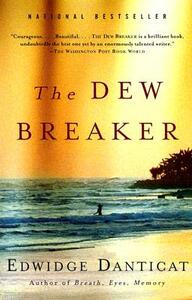Take a photo of a barcode or cover
dark
emotional
informative
reflective
sad
fast-paced
Plot or Character Driven:
A mix
Strong character development:
Complicated
Loveable characters:
No
Diverse cast of characters:
Yes
Flaws of characters a main focus:
Yes
I really liked this book a lot more than I thought I would. It's a well rounded short story collection that tells one larger story of Haitian Americans who all had some large life event that spun out of Duvalier's reign.
This is a book about the effects of Haiti's political developments on people whose sin may have been to be born Haitian. Going into this book not knowing anything really put me off especially when transitioning from one story to another. It consists of short stories about characters from Haiti and their not so pleasant experiences. However, I ended up loving the stories. I was really touched by the main story that is the title. Each story starts vaguely about different characters and with time we discover their connections or none whatsoever to THE Dew Breaker.
Didn’t hold my interest. Couldn’t connect with the characters.
Some of these stories were beautiful, hauntingly so. My favorite was Water Child.
I wasn't entirely captivated by the plot(s?) although I found the characters and their connections interesting.
http://www.rockymountainnews.com/drmn/books/article/0,1299,DRMN_63_2719794,00.html
Haitian lives, Haitian scars
BOOK INFORMATION
The Dew Breaker
Our Rating A
Author: Edwidge Danticat
Publisher: Knopf
Pages: 242 pages
Genre: Fiction
Price: $22
By Jenny Shank, Special To The News
March 12, 2004
Despite her youth, Edwidge Danticat has always written with the gravity and insight of a wise old seer. Still, she could not have foreseen that civil unrest would break out in her native Haiti again, just before the publication of her new novel, The Dew Breaker, making the timeliness of its subject matter acute.
The Dew Breaker examines the violence, corruption, and political instability of an earlier period in Haitian history. Although much of the book is set in present New York City, the narrative of The Dew Breaker spirals around the events of the 1960s and '70s in Haiti when the dictator Francois Duvalier sustained a personal police force to torture his adversaries, called "dew breakers" because they came to claim their victims in the early morning hours when dew still beaded the vegetation.
This description of its setting makes The Dew Breaker sound as though it is a political polemic veiled as fiction, but this is not the case. Danticat's rare gift is her ability to set her novels and stories amid fraught times in which the actions of the government cause upheaval in the lives of regular people, without ever once losing focus on her characters. She leaves the preaching to the preachers, such as the dynamic minister who figures in the denouement of The Dew Breaker.
This book, like her others, never wavers in placing its attention on individual lives, and as she moves from one character to another you feel she is holding their faces up to you, each of them locking the reader with a gaze too intense to shirk.
The face at the center of The Dew Breaker bears a terrible mark, which Ka Bienaimé describes as the "blunt, ropelike scar that runs from my father's right cheek down to the corner of his mouth." Ka, a young sculptor, grew up believing that the scar was the result of an injury her father sustained while he was unjustly imprisoned in Haiti.
When Ka creates an idealistic mahogany sculpture of her father, he destroys it and finally admits that he "was the hunter, he was not the prey," someone unworthy of a sculpture. He had been working as a torturer in a prison in the 1960s, and the scar was the result of an attack by his final victim.
The rest of the novel unfolds in chapter-long snapshots of the lives of people who this dew breaker affected. Many of them have immigrated to New York; some of them are haunted by the illusion that they see their former torturer everywhere they go, and some actually see him.
One such victim is Michel, whose parents were killed by the dew breaker when he was a young boy. His aunt Estina raised him in rural Haiti and he later moved to New York. When he is a young man, he recognizes the barber from whom he rents an apartment as being the man who killed his parents, and he goes on a pilgrimage to visit Estina in her village and ask what he should do about this.
Danticat's descriptions of this visit are frequently lovely: "His aunt was leaning forward with both hands holding up her face, her white hair braided like a crown of gardenias around her head."
Estina dies before Michel can extract from her the crucial answer to his question, and he is left, like the other characters in this book, to ponder alone the implications of what was done in the past for what must be done in the present. The portrait of Michel, like those of others in The Dew Breaker suggests that everyone's experience of pain is so individual that each person must come to his own conclusion about how to best lead his life in its wake.
Although The Dew Breaker is a somber book, it is not without hope. The characters in it may never be able to shake their memories from their terrible experiences, but they all have been resilient enough to craft new lives for themselves that bear little resemblance to the old ones.
This is a survivors' tale. As Danticat writes about the dew breaker's wife, she lives daily with full knowledge of her husband's past but cannot dwell on it because "She was too busy concentrating on and revising who she was now, or who she wanted to become."
It is easy to see from this accomplished novel that as long as the people of Haiti are cursed to live in interesting times, Edwidge Danticat will be there to bear witness.
Jenny Shank's short stories have appeared in CutBank, Michigan Quarterly Review, and other magazines, and one was nominated for a Pushcart Prize.
Haitian lives, Haitian scars
BOOK INFORMATION
The Dew Breaker
Our Rating A
Author: Edwidge Danticat
Publisher: Knopf
Pages: 242 pages
Genre: Fiction
Price: $22
By Jenny Shank, Special To The News
March 12, 2004
Despite her youth, Edwidge Danticat has always written with the gravity and insight of a wise old seer. Still, she could not have foreseen that civil unrest would break out in her native Haiti again, just before the publication of her new novel, The Dew Breaker, making the timeliness of its subject matter acute.
The Dew Breaker examines the violence, corruption, and political instability of an earlier period in Haitian history. Although much of the book is set in present New York City, the narrative of The Dew Breaker spirals around the events of the 1960s and '70s in Haiti when the dictator Francois Duvalier sustained a personal police force to torture his adversaries, called "dew breakers" because they came to claim their victims in the early morning hours when dew still beaded the vegetation.
This description of its setting makes The Dew Breaker sound as though it is a political polemic veiled as fiction, but this is not the case. Danticat's rare gift is her ability to set her novels and stories amid fraught times in which the actions of the government cause upheaval in the lives of regular people, without ever once losing focus on her characters. She leaves the preaching to the preachers, such as the dynamic minister who figures in the denouement of The Dew Breaker.
This book, like her others, never wavers in placing its attention on individual lives, and as she moves from one character to another you feel she is holding their faces up to you, each of them locking the reader with a gaze too intense to shirk.
The face at the center of The Dew Breaker bears a terrible mark, which Ka Bienaimé describes as the "blunt, ropelike scar that runs from my father's right cheek down to the corner of his mouth." Ka, a young sculptor, grew up believing that the scar was the result of an injury her father sustained while he was unjustly imprisoned in Haiti.
When Ka creates an idealistic mahogany sculpture of her father, he destroys it and finally admits that he "was the hunter, he was not the prey," someone unworthy of a sculpture. He had been working as a torturer in a prison in the 1960s, and the scar was the result of an attack by his final victim.
The rest of the novel unfolds in chapter-long snapshots of the lives of people who this dew breaker affected. Many of them have immigrated to New York; some of them are haunted by the illusion that they see their former torturer everywhere they go, and some actually see him.
One such victim is Michel, whose parents were killed by the dew breaker when he was a young boy. His aunt Estina raised him in rural Haiti and he later moved to New York. When he is a young man, he recognizes the barber from whom he rents an apartment as being the man who killed his parents, and he goes on a pilgrimage to visit Estina in her village and ask what he should do about this.
Danticat's descriptions of this visit are frequently lovely: "His aunt was leaning forward with both hands holding up her face, her white hair braided like a crown of gardenias around her head."
Estina dies before Michel can extract from her the crucial answer to his question, and he is left, like the other characters in this book, to ponder alone the implications of what was done in the past for what must be done in the present. The portrait of Michel, like those of others in The Dew Breaker suggests that everyone's experience of pain is so individual that each person must come to his own conclusion about how to best lead his life in its wake.
Although The Dew Breaker is a somber book, it is not without hope. The characters in it may never be able to shake their memories from their terrible experiences, but they all have been resilient enough to craft new lives for themselves that bear little resemblance to the old ones.
This is a survivors' tale. As Danticat writes about the dew breaker's wife, she lives daily with full knowledge of her husband's past but cannot dwell on it because "She was too busy concentrating on and revising who she was now, or who she wanted to become."
It is easy to see from this accomplished novel that as long as the people of Haiti are cursed to live in interesting times, Edwidge Danticat will be there to bear witness.
Jenny Shank's short stories have appeared in CutBank, Michigan Quarterly Review, and other magazines, and one was nominated for a Pushcart Prize.
Poor Synopsis doesn't
Capture what the book is about. A series of stories revolving around the dew breaker rather a straight line of a story. Hard to put down once you, the story moves in an interesting, intersecting fashion.
Capture what the book is about. A series of stories revolving around the dew breaker rather a straight line of a story. Hard to put down once you, the story moves in an interesting, intersecting fashion.
emotional
mysterious
sad
tense
medium-paced
Plot or Character Driven:
A mix
Diverse cast of characters:
Yes
I didn't understand everything, but it was still pretty good. Very immersive, and lush. Go pick it up.



